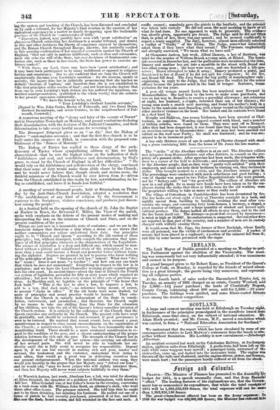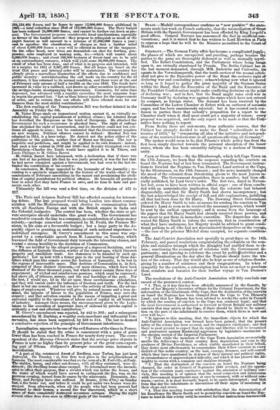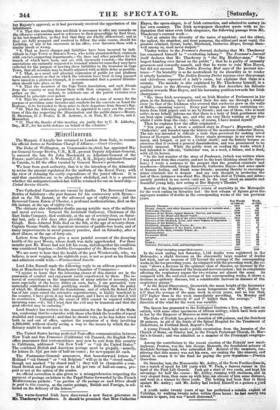ft furrign null efflouill.
FEANCE.—The Minister of Finance has presented to the Assembly his budget for 1851, in a speech unusually clear, and free from financial "effect." The leading features of his explanations are, that the (1even-' ment has so economized its- expenditure, that while the total receipts of 1851 will be 1,292,633,639 francs, the total expenses will not be mare than 1,283,826,150 francs. The great retrenchment effected has been on the Army expenses. In 1848 the war budget was 420,000,000 francs; the Minister has reduced it to 314,154,484 fianes, and he hopes to spare 12,000,000 francs additional In
total reduction since 1848. of 119,000,000 francs. The Navy budget has been reduced 24,000,000, francs, and cannot be further cut down at pre- sent. The Government proposes considerable fiscal ameliorations, especially in favour of the landed interest: they propose to relinquish so much of the irap5t foncier as will amount to a revenue of 27,000,000 francs a year; o to equalize the classific.tion of charges so that a further relief of about 6,000,000 francs a year will be effected in_ favour of the taxpayer. On the other hand, new- taxes are demanded.—on shot for fowling, gun-
• leder, wilts employed in making soda, &c.—which will render about
,000 francs; and about 106,900 hectares of forest-land are to be sold aa an. extraordinary resource, which will yield some 50,000,000 franca The result of what has been done, and of what is in progress and intended, will he a surplus for 1851 of 8,807,489 francs. But all hopes are based on the trust that peace and internal order will be maintained. The country has already given a marvellous illustration of the effects due to confidence and public security: notwithstanding the call made on the country for the 45 centimes, it has returned to its normal condition' and there were at the end of February only arrears of half a twelfth on the year 1849. The funds have increased in value by a milliard, and drawn up other securities in proportion; the savings-banks accompanying the movement Commerce, for some tim depressed, has advanced with a rapidity exceeding the most sanguine hope to regain the ground. lost "Let us then labour together for the improvement of order, and be certain that our efforts will have effected more for our finances than the most skilful combinations."
The first reading of the Transportation Bill was further debated in the Assembly on Friday the 5th.
M. Victor Hugo made an impassioned oration against it as virtually re- establishing the capital punishment of political crimes ; for Admiral Brunt has described the MarcleS9.8 as the tomb of Europeans. Ile attacked the Government ror such a recurrence to physical force. The right of suffrage has abolished the right of insurrection, and he therefore could not but con- demn all appeals to arms.' but he contended that the Government requires no new weapon. Political offences cannot be defined : Marshal Ney was criminal in 1815 is a hero today. He desired not the policy either of the guillotine or the gallows, neither that of Meant nor Haynau. The law is- impolitic and, perfulious and might be applied to its own framers: indeed, had such a law existed in 1830 and 1848—had Royalty triumphed over the Revolution—Charles the Tenth would have applied it to M. Thiers, and Louis Philippe to M. Odilon Barret. hr. °aka. Barret here interposed,- with, a declaration that if there was one fact of his political life that he was justly proud of, it was the fact that he bad never conspired against a Government, but had ever to the last de- fended the constitution of his country. In conclusion, M. Hugo appealed to the humanity of the Assembly ; re- ciuring to a spectacle unparalleled in the history of the world—that of the combatants of February assembling in the square and proclaiming the aboli- tion, of capital punishment for political offences. He besought all parties to bear in mind that.they have France to save, amino time to hate and per- secute each other.
Ultimately the bill was read a first time, on the division of 431 to 21.7.
The Faris and Avignon Railway-Bill has afforded occasion for interest- ing debate. The line proposed would bring London into direct commu- nication with the Mediterranean, and shorten its communication both with all -Southern Europe and with the British empire in India and the Colonial Antipodes. The contest has been, whether the state or pri- vate enterprise should undertake this great work. The Government has resolved to 'concede the line tea company, in consideration of a large money subsiely„—perhaps somewhat constrained by 31-Fould, the Finance Mi- nister, in his aims at a favourable budget ; but a large party in the As- sembly object to granting an undertaking of such national importance to individual. enterprise. AL Grevy's amendment in this sense was sup- ported by a remarkable speech from M. Lamartine on. Tuesday, which traversed the field of Government duty towards the labouring- classes, and vented a strong-hostility to the doctrines of Communism.
"We' are terrified by the alleged progress of a depraved Socialism, and by the diffusion of fantastic theories, worthy of the darkest ages, which threaten property and annihilate trade. Are statesmen to be daunted by such ap- paritions? Let ID look with a firmer gaze to the real bearing of those doc- trines which pass like comets across the horizon of humanity, to be lost in the regions of inaccessible space. This doctrine of Communism is, in fact, composed of three distinct elements,—of mere ohimeras, which have been steamed of for three thousand years, but which cannot sustain three days of experiment ; of wicked and nemehievous passions, which must be repressed; but above all; of idleness, misery, and the real hardships of the poor. For the first, r would' say, let in the air upon these unwholesome exhalations, and they will vanish under the influence of freedom and truth. For the last there is but one remedy, and but one law—the activity of labour, the advan- tages of employment. 'Whatever will give by natural means and a true do- rand, the impulse of labour to the population of France' may save the country ; and that salvation consists in the means of imparting a great and universal rapidity to the operations of labour and-of capital in all branches. of industry. Amongst those means, the encouragement given by the Legis- lature to the- execution of important lines of railroad by private capital is evidently a vast and effectual contribution."
M. Grevy's amendment was rejected, by 443 to 205; and a subsequent amendmentby M. Darblay, a wealthy corn-merchant and influential Con- servative, has amen been. negatived, by 358 to 314. The last is deemed a conclusive rejection of the principle of Government interference.
Incendiarism appears to be one of the evil. Eatures of the times in France. It should be stated that the crime is concurrent with a price of grain rower than haabeen reached in France The nearly forty years: The cone- 9ondent of the Morning. Chronicle states that the average price of grain in France is now- no higher than its present price at the great corn-export- ing port of Odessa. GalignanCe Messenger recounts some instances of incendiarism.
" A part of the communal forest of Borderer, near Tarbes, has just been destroyed. On Tuesday t: st, four fires took place in the neighbourhood of Scissors. The most considerable was that on the farm of a M. Fortville, atPasly.
me stables, barns, and other out-houses, with all they contained, were de- stroyed; the dwelling-house alone escaped. So determined.were the incendi- aries to effect their purpose, that a rivulet which tan before the house, and the water of' which would have served to extinguish the fire, was, on the preldous evening, tinned from its course by the miscreants. Dommiers, Mn bleuy, and juvigny have also suffered. At Sturm, (C6te d0r,) OD Sunday Itiat,-a fire broke out, and before it could be got under two houses were de- etroyed. Soon afterwards, when all the people who had been present had returned to .then homes, a second fire was discovered, which in a short apace of time completely destroyed seventeen cottages. During the night several other fires were seen in different Larts of the country.'
1 I
Sesne.—Madrid correspondence confirms as " now positive " the state- ments made last week on French authority, that the reconciliation' of Great Britain with the Spanish Government has been effected by:King Leopold's good offices- General Narvaez has announced the fact in. unoffieial °Da- ve:mations ; audit is stated that he has written to Lord Howden at. Paris to express a hope that he will be the Minister accredited to the Court of Madrid.
Grans/qr.—The German Unity affair has become a complicater/ juggle; the phases of which are unexpected and puzzling, perhaps because the parties to the game are thoroughly dishonest as well as mutually mysti- fied. The Erfurt Constitution, and the Parliament whose being hangs upon it, are virtually abandoned by Prussia. The Berlin Cabinet has at the last moment demanded, through MIL Radosvitz and Carlowitz, ita agents in the Verwaltungsrathr that the- tenth section of the second. article shall not give to the Executive power of the Bend the exclusive right of declaring war and concluding peace ; acknowledging now what it ignored so long as it hoped to gather the great majority of the German States within the Band, that the Executive of the Bland and the Executive of. the Frankfort Confederation might make conflicting decisions on the point of declaring war ; and in fact, that the Bund might raise civil war in Germany itself by declaring war against the states which have net entered its compact, as foreign states. The demand has been received by the Committee of the Lower Chamber at Erfurt with an outburst of sarcastic anger, and has been unanimously rejected; but it has created such con- fusion in parties. there that nobody's proposition for a report to the Chamber itself when it shall meet eould get a majority of voices; every proposal was negatived, and the only report to be made is that the Vont- mittee have' nothing to report. From Berlin there are statements, from authentic sources, that the Cabinet has plumply decided to make the Blind "subordinate to the treaties of 1815," by renouncing all idea of the initiative and independ- ence of the restricted federal state in all questions affecting all Germany."
The upshot would seem to be, that Prussia's whole policy has from the first been simply directed towards the personal absorption of the lesser states, whom she has been ostensibly rallying to a nueleus of German unity.
CAPS OP GOOD Hoen.—By the Ellenborough, which left Cape Town on. the 17th January, we learn that the suspense regarding the convicts on board the Neptune had at last been terminated. The Government instrue- tions to forward the Neptune to Van Diemees Land arrived at the Cape, by the Glentanner, on the 13th January ; and the news instantly changed the mood of the colonists from threatening gloom to the most rpm sa. tisfaction. The Government despatches, three in number, had been offi- cially published; by Lord Grey's cutler. The first two, dated in Novem- ber last, seem to have been written in official anger : one of them conclu- ded with an unmistakeable implication. that the colonists had behaved disgracefully, and that Sir Mpg Smith had shown incompetency; but the last acknowledged the receipt of full and able explanations, justifying all that had been done by Sir Harry. The Downing Street Government ordered Sir Harry Smith to take measures for sending the convicts to Van Diemees Land as soon as-he received the necessary powers, which would be sent by the earliest opportunity; anti it seems from the language of- the papers that Sir Harry Smith had already received those powers, and. was about to put them in immediate execution. The despatches also dip rected Sir Harry Smith to inform the convicts, that in. consideration of what they have undergone, her Majesty would be advised to grant cond. tional pardons to all who had not misconclucted themselves on the. voyage,, —the ease of the prisoner Mitchel alone excepted, for separate considersre tion.
The Anti-Convict Association met specially in great -force on the 1.411- February, and passed resolutionscongratulating the colonists on the com- plete anclstainless triumph which the Almighty had enabled them to ob- tain; sanctioning the resumption of relations with the Government de- partments ; and agreeing to celebrate the event by publickfestivities ant a. general illumination on the day- after the Neptune should leave the wa- ters of the colony. That day would also be kept asone of religious thanker- giving by a number of ministers and their congregations. In' token of sympathy for the convicts, a subscription had been set on foot to purchase them comforts and luxuries for their further voyage to Van Diemen'e Land.
The resolutions of the Anti-Convict Association will fitly conclude our record of the protracted contest. "1. That, as it has this day been officially announced is the Gazette, by order of her Majesty's Secretary, of State for the Colonial Department, for the information of the inhabitants ofthe Cape, that the destination, of the convicts on board the Neptune has been changed from the Cape to Van Diemen's Land; and that her Majesty bus been advised to revokethe order in Council by which the sending of convicts to the Cape was rendered legal ; and that the local Government is authorized to forward to Great Britain any military convicts that may arrive at the Cape, if there should be likely to be opposi- tion oil the part of the inhabitants to receive them, which therein now and ever will be,— " It appears to this meeting, that the immediate objects for which the Anti-Convict Association was formed have been gained; that the present safety of the colony has been secured, and its character vindicated; and that i there s good ground to expec.t that its rights and liberties will be recognized and guaranteed..against aggression by legislative enactineuta in the ensuing session of the Imperial Parliament. "2. That while the members of the Cape Town Association reverentially ascribe the deliverance of their country foam degradation and ruin to the goodness of Divine Providence, so often visibly manifested in their behal4 they desire most affectionately to congratulate their fellow colonists in every district of this noble country, on the zeal, courage, firmness, and self-control- which they have manifested in, defenoe of their, natural and political rights, in circumstances of unprecedented difficulty, and which it has pleased the Ale- mighty to. crown with_ a complete and etainiese triuinph. "3. That the destination, of the convicts on board the Neptune bong chanced, the order in Council of September 1848 revoked, and the opposi- tion of the colonists made conalusive against the admission of military con- victs, this meeting is of opinion, that the usual connexion and intercourse with Government departments may at once be resumed, with or without con- tracts,—never, it is most fervently hoped, to he again interrupted; and that from this day the inhabitants do discontinue all their signs of mourning in their shops and stores. "4. That this meeting learns with satisfaction. that the determination of his Excellency Sir Harry Smith not to permitthe convicts on board the Nei,- tune to landin this colony until he received further instructions haszeceived.
her Majesty's approval, as it had previously received the approbation of the inhabitants.
' "5. That this meeting does not think it necessary to offer any remarks on the offensive expressions used in reference to their proceedinks by Earl Grey, in his last despatches, as they feel that they are whollyAdeserved; and as they are fully prepared and resolved to follow the same course, should his Lordship, or any of his successors in his office, ever threaten them with a similar insult or wrong.
"6. That as heavy charges and liabilities have been incurred by indi- viduals in Cape Town or Simon's Town, who nobly abandoned their contracts with convict-supporting departments,—the fines and other penalties for the breach of which have been, and are still, rigorously exacted,—the district associations are earnestly requested to transmit whatever sums they may have collected for the purpose of meeting these liabilities to the treasurer in Cape Town, that all accounts may be finally adjusted with as little delay as possible. "7. That, as a usual and pleasing expression of public joy and gladness when such contests as that in which the colonists have been so long engaged have issued in a glorious triumph, it is recommended that a general illumin- ation should take place on the instant. "8. That the members of the Cape Town Association, and such friends from the country as may favour them with their company, shall dine to- gether on the instant, to celebrate one of the purest victories ever obtained by principle over power.
"9. That the members now present do subscribe a sum of money for the purpose of providing some luxuries and comforts for the convicts on board the Neptime, to be forwarded to them prior to their departure from Shnon's Bay. 10. That the following gentlemen be appointed to carry out the resolu- tions of this day respecting the illumination and the public dinner—Messrs. H. Sherman, 0. J. Truter, R. H. Arderne, A. de Pass, II. C. Jarvis, and J. Mosenthal.
"11. That the thanks of this meeting are justly due to C. B. Adderley, Esq., M.P., for his noble defence on behalf of the colonists."




























 Previous page
Previous page